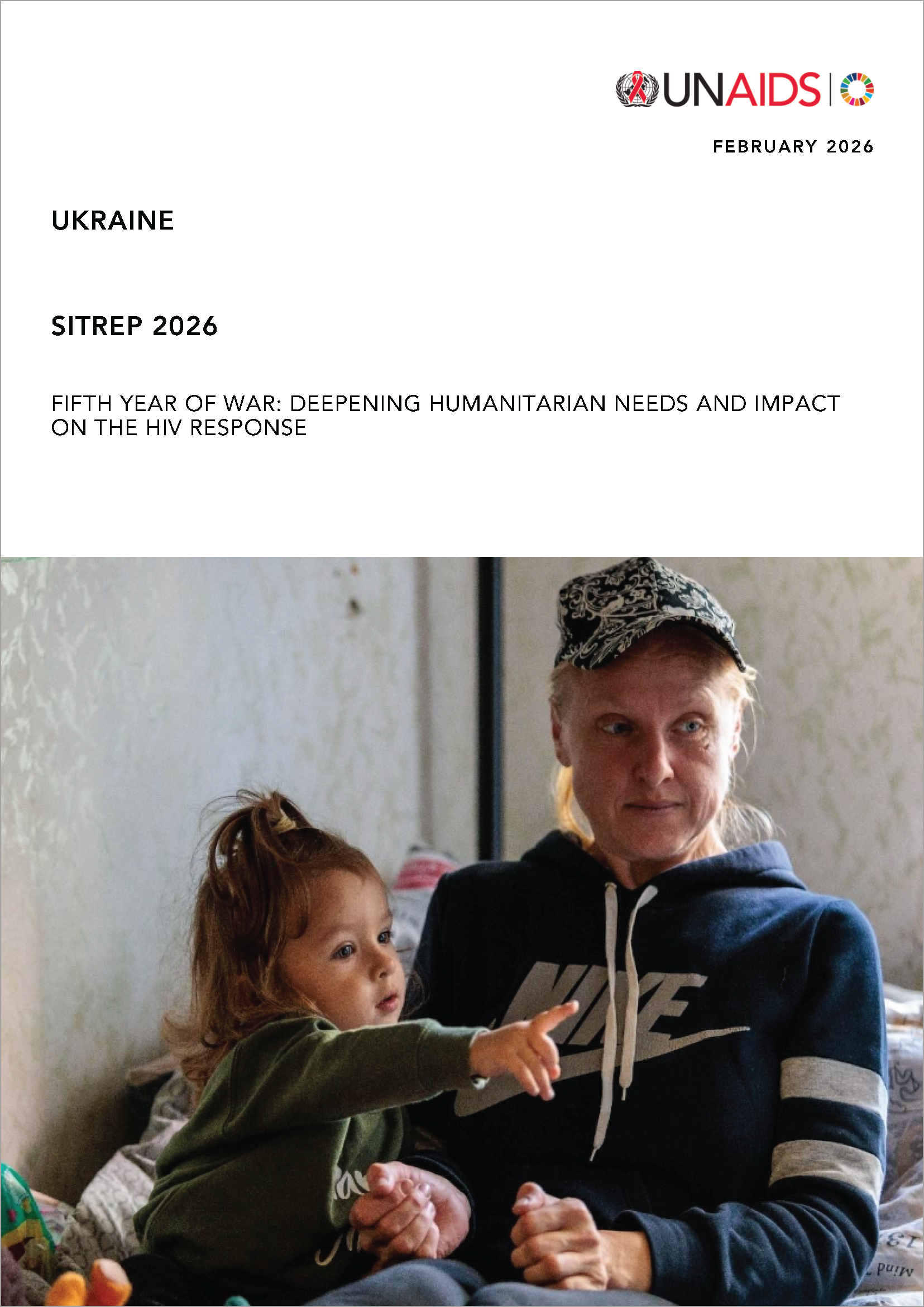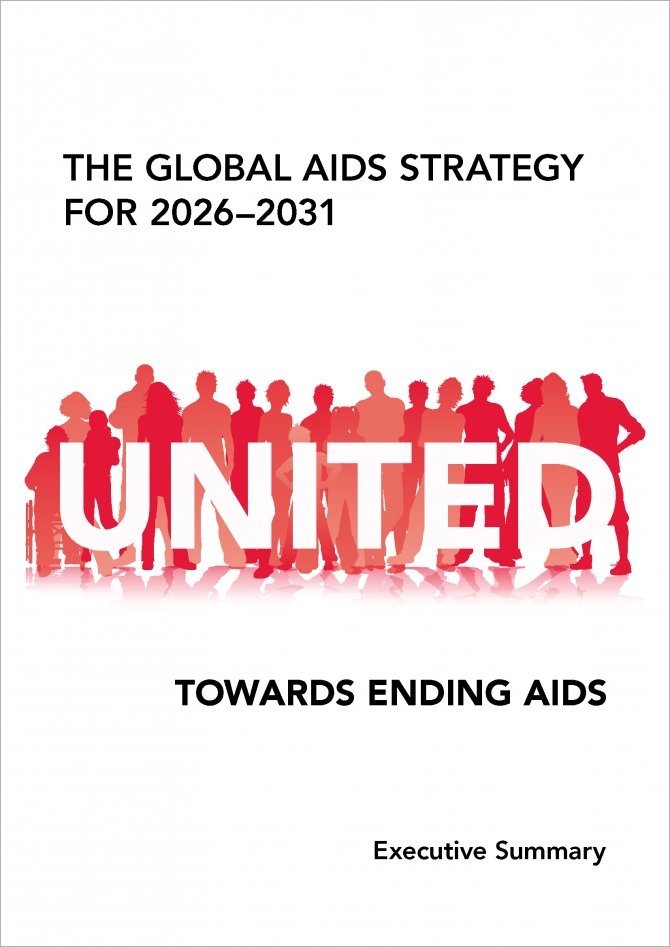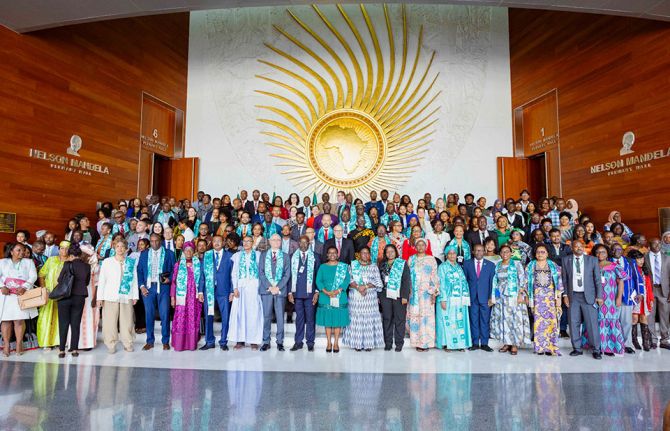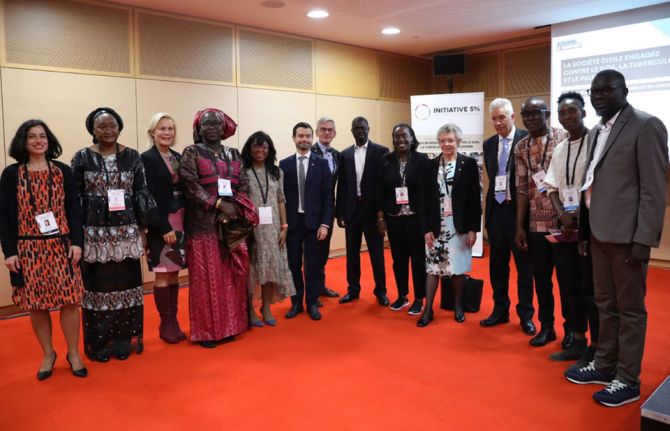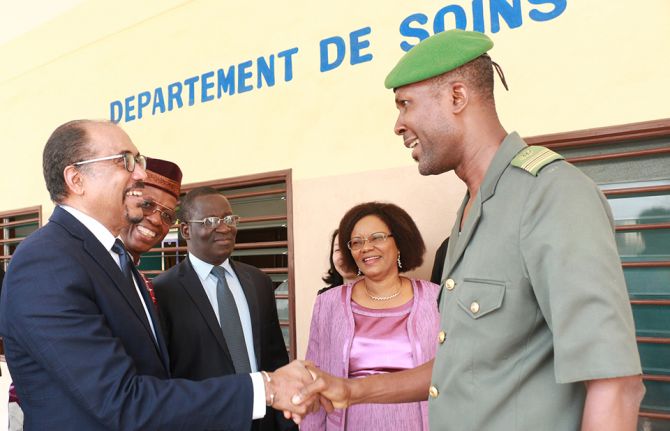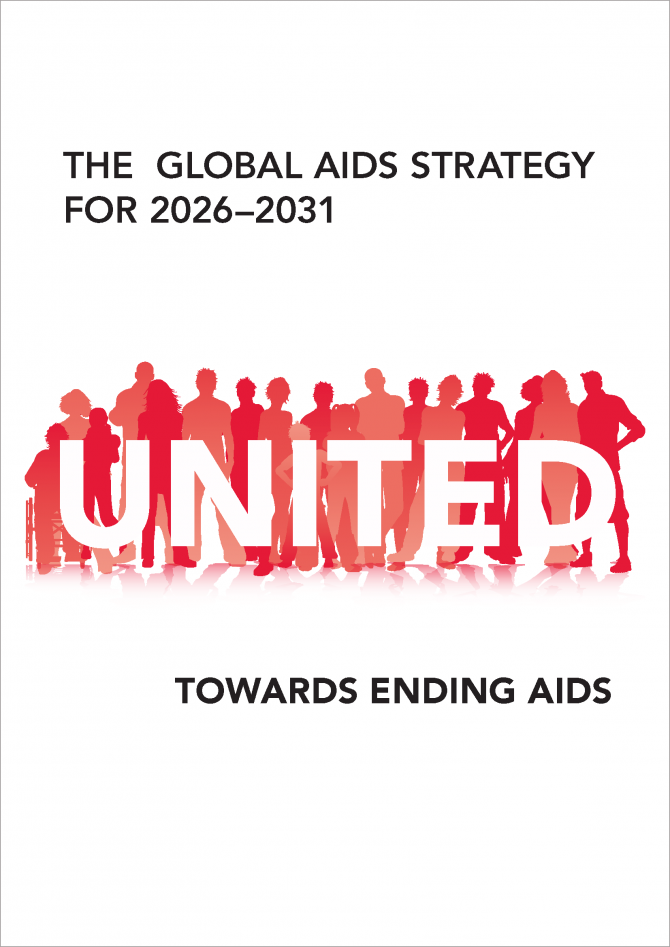
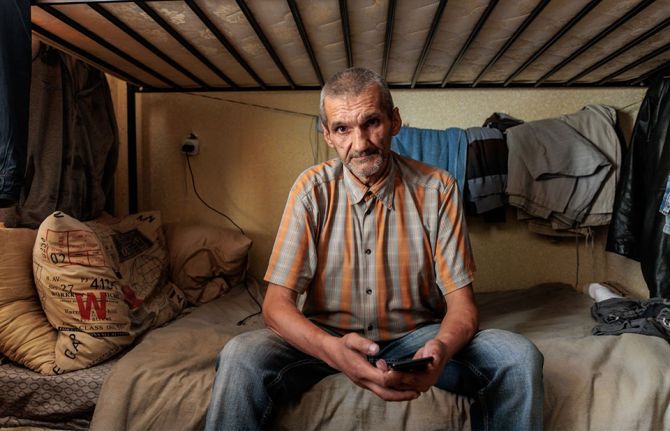
Feature Story
Keeping people in care
23 February 2026
23 February 2026 23 February 2026Fifth year of war in Ukraine: deepening humanitarian needs and impact on the HIV response
In Kryvyi Rih, war is measured not only in sirens and blackouts, but in whether people can continue getting the medicines that keep them alive. The city has become a lifeline for displaced people living with or affected by HIV arriving from frontline and temporarily occupied areas—often without documents, stable housing, or a clear route back into care.
“People come to us exhausted, carrying everything they have in one bag,” says Oleksandr Shveda, a social worker at a community-run shelter operated by the charitable organization Public Health. “Some haven’t taken antiretroviral therapy for days or weeks—not because they didn’t want to, but because they lost access, lost papers and didn’t know where to turn.”
This is what Ukraine’s fifth year of war looks like for the HIV response: care delivered through delays, danger and uncertainty, often to people who are least visible and most excluded.
People living with HIV and other groups vulnerable to HIV can be overlooked by mainstream humanitarian and social protection programmes. Many people from key populations remain marginalized and fall outside the “typical” categories reached by humanitarian assistance and social protection programmes, even though they face some of the highest health and protection risks. In wartime, when systems are overstretched and priorities narrow, these communities can fall even further out of reach.
“They often try to stay invisible,” explains social worker Olena Maligina. “But HIV doesn’t wait, and neither does Tuberculosis. Keeping someone in care is not just about medicine—it’s about safety and trust.”
Continuity of HIV care is not only a matter of individual survival; it is a public health necessity. Maintaining treatment, counselling and referral pathways helps prevent interruption, reduces severe illness, limits onward transmission, and supports reintegration upon release.
However, with limited staff capacity, reliance on volunteers, and close coordination with national partners, the team at the Public Health organization says it is becoming harder to reach the people most at risk—especially medically fragile people living with HIV, including palliative and bedridden patients. “We are doing everything we can,” Ms Shveda adds, “because for some people, this support is the only bridge to life and dignity.”
Across the country, the humanitarian crisis continues to deepen, with profound consequences for access to essential services, including health care. In frontline areas, intensified hostilities have left health facilities damaged or non-functional, created severe staff shortages, and made it unsafe for ambulances to reach remote or heavily affected areas. For HIV services, the energy crisis has become an ongoing barrier to continuity. Power outages disrupt clinic operations, laboratories, health information systems, telecommunications and transport—making it harder for health workers to deliver services and for people living with HIV to access care and remain on treatment.
The combined pressures of protracted conflict, displacement, poverty, and infrastructure damage are eroding coping capacities and increasing the risk of HIV treatment interruption. In this environment, community-led and community-based responses remain central to maintaining reach, trust and continuity, especially for people facing insecurity, displacement and social vulnerability. Yet these organizations are under growing strain: staff capacity is shrinking, burnout risks are rising, and operational constraints make every visit, delivery and follow-up more difficult.
The Government of Ukraine, through the Ministry of Health and the Ukraine Public Health Center, continues to lead the national response in close partnership with community organizations to sustain services under wartime conditions. Support from international partners and donors—especially the United States Government, the Global Fund to Fight AIDS, Tuberculosis and Malaria, Expertise France, the Government of the Netherlands, and other bilateral and multilateral partners—has been critical to maintaining essential HIV prevention, testing, treatment and care.
“Ukraine’s resilience is visible in the remarkable courage of its people—and in the determination of health-care workers and community organizations who keep services going when conditions make it feel impossible,” says Eamonn Murphy, UNAIDS Regional Director for Easter Europe and Central Asia and Asia and the Pacific. “They keep services open, reach people on the move, and ensure no one is left without care. Their work is built on trust, and in this war, that trust can be lifesaving. We must continue supporting community-led services so people can stay on treatment safely and with dignity.”
In 2026, the AIDS response will remain heavily dependent on external support, underscoring the need for strategic, predictable funding to sustain essential services while also beginning, where it is feasible, to plan a gradual transition towards nationally owned systems and community-led structures.
The message from Kryvyi Rih is clear: continuity of care is not automatic in a war—it is built, protected and must be sustained.
Region/country
Related
 Women, HIV, and war: a triple burden
Women, HIV, and war: a triple burden

12 September 2025
 Displacement and HIV: doubly vulnerable in Ukraine
Displacement and HIV: doubly vulnerable in Ukraine

11 August 2025

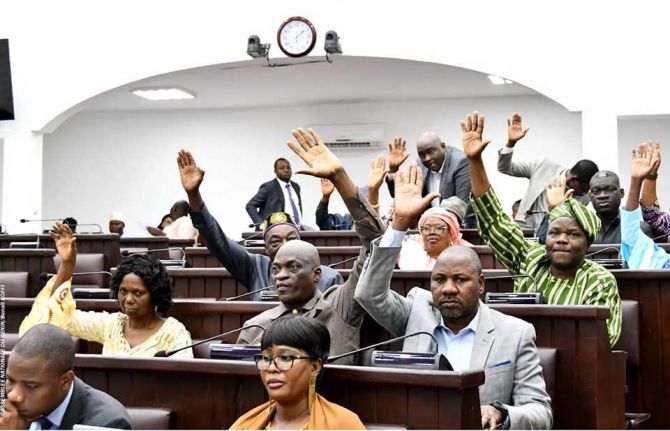
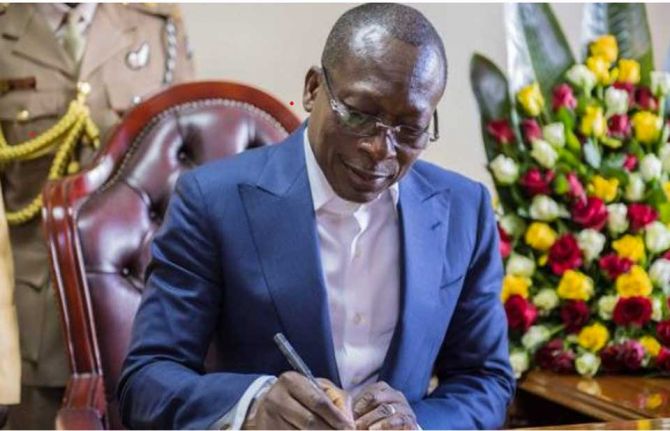
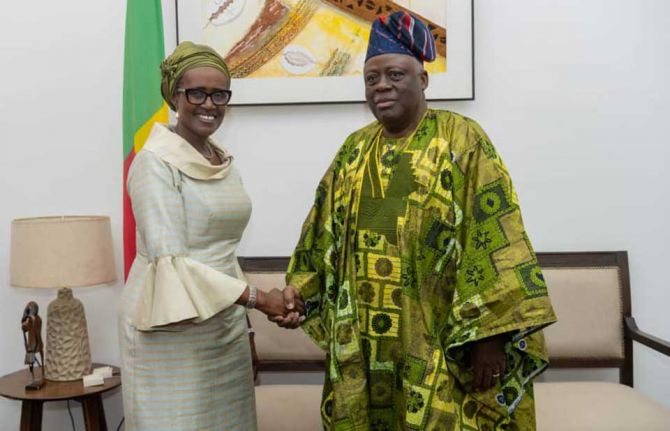
Feature Story
Benin adopts positive new law on HIV prevention, care and elimination of stigma and discrimination
20 February 2026
20 February 2026 20 February 2026UNAIDS welcomes the passing into law by the President of Benin Patrice Talon of Law 2026-02 on 9 February 2026. The law focuses on HIV prevention and management of care and will accelerate progress towards ending AIDS in the Republic of Benin.
The new law is the culmination of a process first initiated in 2013 and which resumed in 2020 under the leadership of the Health Program for the Fight against AIDS (PSLS). This revision was made due to the significant limitations of the 2006 law, namely that it was based on a punitive, coercive and stigmatizing approach.
The previous law was incompatible with human rights standards, allowed for numerous violations of confidentiality, criminalized HIV-related behaviors and reinforced the marginalization of key populations. The law was out of step with good public health practices which should be based on prevention, inclusion and respect for human rights.
The 2026 law is now aligned with international human rights standards and more specifically reaffirms the right to non-stigma and non-discrimination. It enhances privacy and data protection, ensures access to HIV care and prevention and services and recognizes key populations including sex workers, men who have sex with men, people who inject drugs, transgender people, migrants and prisoners among others. It improves prisoners’ rights significantly and reduces criminal provisions against people living with HIV by recognizing the strictly voluntary nature of disclosing HIV status.
“The journey to validating Benin’s HIV Law was powered by strong country leadership, exceptional UNAIDS–UNDP collaboration, unwavering support from the UN Regional Coordinator, close technical follow-up with the Ministry of Health, catalytic funding from UNAIDS, UNDP and Expertise France, and close involvement of parliamentarians — turning evidence into political will and political will into transformative legislation’’ said Yayé Diallo, outgoing UNAIDS Country Director for Togo and Benin.
The progress is the result of coordinated advocacy and collaborative partnership actions at all levels involving the UNAIDS Executive Director Winnie Byanyima, who made it a priority of her visit to Benin in September 2024.
UNAIDS Regional Office, the global HIV Legal Network and UNDP provided technical support. The Global Fund and Expertise France provided financial support and the combination of the efforts of various stakeholders at the local level, namely the PSLS, the CNLS-TP(Conseil National de Lutte contre le VIH/Sida, la Tuberculose, le Paludisme, les Hépatites, les Infections Sexuellement Transmissibles et les Épidémie), the parliament and its institutions (IPaB - Institut Parlementaire du Bénin), the caucus of women parliamentarians and parliamentary committees), civil society organizations including networks of people living with HIV and key populations. With this new law and rigorous monitoring of its application, Benin is resolutely committed to its march towards the ending AIDS by 2030.
"UNAIDS, the UN Country Team, and partners including Expertise France applaud Benin’s political resolve and its new, pioneering HIV legislation. By centering the law on vulnerable groups and youth who account for 35% of new infections, Benin is taking a giant leap towards universal access to HIV treatment and the ultimate goal of ending AIDS as a public health threat by 2030." said Christian Mouala, Representative and Director of the UNAIDS Multi-Country Office for Côte d’Ivoire, Togo, and Benin.
Region/country
Related

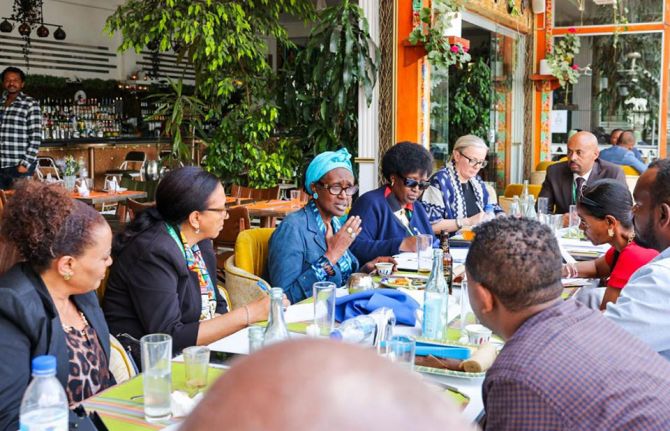
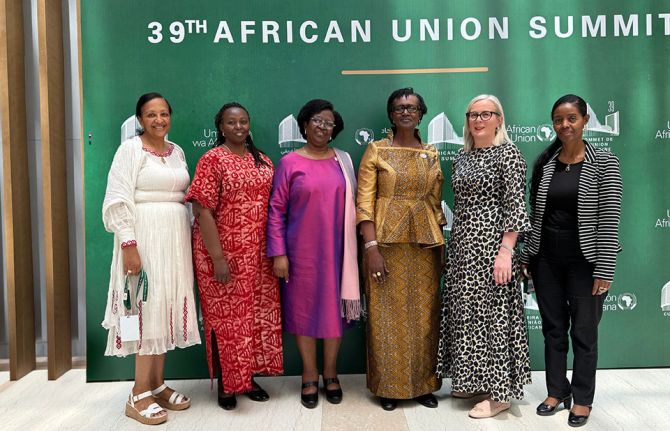
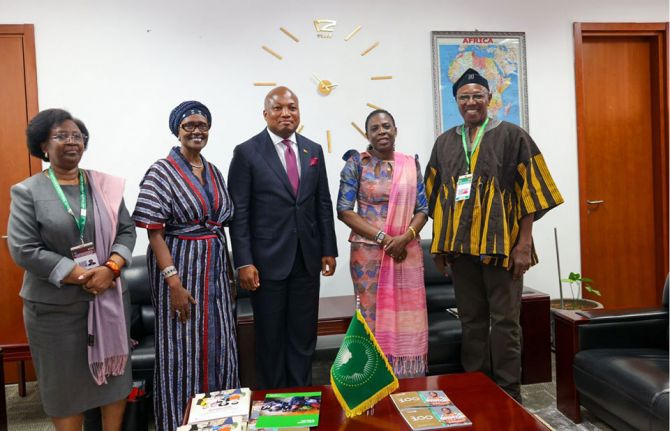
Press Release
UNAIDS rallies African leaders to remain united to end AIDS
17 February 2026 17 February 2026GENEVA, 17 February 2026—At the 39th African Union summit, UNAIDS urged African leaders to stay united, keep HIV high on the political agenda and move towards sustainable financing for health and development.
“AIDS is not over in Africa and continued African leadership is essential,” said Winnie Byanyima, Executive Director of UNAIDS. “Now is the moment to raise ambition, safeguard our gains and ensure Africa drives the global agenda for a sustainable and sovereign health future.”
In 2024, 82% of people living with HIV in Africa were on lifesaving treatment compared with 45% just ten years earlier. New HIV infections were reduced by 71% since their peak in 1994 and AIDS-related deaths were reduced by 75% since the peak in 2004.
However, 26.5 million people were living with HIV in Africa in 2024, which represents 65% of global total—4.8 million of whom were still not accessing HIV treatment. There were 390 000 AIDS-related deaths in 2024, representing more than 60% of AIDS deaths globally.
The summit took place as Africa advances on health sovereignty and more equitable global cooperation through initiatives like the Accra Reset, the Lusaka agenda, and the African Union Roadmap to 2030. UNAIDS underscored the importance of anchoring HIV sustainability within this broader agenda to ensure resilient, community centred health systems across the continent.
African countries are facing serious financial pressure, with debt repayments often outstripping health spending, and revenue collection that has stalled below 16% of GDP for over a decade. Securing Africa’s health sovereignty will require action to relieve debt, fight tax dodging, increase revenue collection, and ensure access to affordable financing.
In 2024, 77% of funding for Africa’s HIV response came from external sources. Significant disruption to the financing landscape has left serious gaps, particularly for HIV prevention and community health systems, which are often the most reliant on external financing. This continues even as funding from Africa’s largest HIV donor, the United States, has partially returned.
UNAIDS’ approach to HIV sustainability places the focus on transforming the HIV response and accompanying countries on their transition journey—especially in convening partners, strengthening data and evidence, advancing integration processes and keeping communities at the table.
Twenty-two African countries, with support from UNAIDS and partners, are developing sustainability and transition plans to secure an increasingly self-reliant HIV response beyond 2030, planning for increased domestic investments and accelerated integration into national health systems. Eleven African countries have already reported increases in their national HIV budgets for 2026, demonstrating political commitment to long-term sustainability.
Multilateralism and global solidarity have been a cornerstone of progress in the response to HIV. The 2026 United Nations General Assembly High Level Meeting (HLM) on HIV/AIDS offers an opportunity to secure ambitious global commitments for the next five years. A strong Common African Position will be critical to influencing the global agenda and ensuring African priorities are reflected in the 2026 Political Declaration on AIDS.
The Political Declaration will build on the Global AIDS Strategy 2026–2031, adopted by the UNAIDS Programme Coordinating Board in December 2025, which was shaped with input from governments, communities, regional bodies and the private sector.
For more information see “Africa united to End AIDS”
UNAIDS
The Joint United Nations Programme on HIV/AIDS (UNAIDS) leads and inspires the world to achieve its shared vision of zero new HIV infections, zero discrimination and zero AIDS-related deaths. UNAIDS unites the efforts of 11 UN organizations—UNHCR, UNICEF, WFP, UNDP, UNFPA, UNODC, UN Women, ILO, UNESCO, WHO and the World Bank—and works closely with global and national partners towards ending the AIDS epidemic by 2030 as part of the Sustainable Development Goals. Learn more at unaids.org and connect with us on Facebook, Twitter, Instagram and YouTube.


Feature Story
Strengthening partnerships to sustain the HIV response in Eastern Europe and Central Asia
12 February 2026
12 February 2026 12 February 2026“We’re closely watching developments in both infection rates and funding in Eastern Europe and Central Asia. The challenges are great,” said Anne von Fallois, CEO of Deutsche AIDS-Stiftung (DAS), during a meeting with Eamonn Murphy, UNAIDS Regional Director, in Bonn. “We’re united on the importance of the region—especially Ukraine.”
This is a critical moment for the AIDS response in Eastern Europe and Central Asia (EECA). As global attention shifts to new crises, there is growing concern that the region—where both new HIV infections and AIDS-related deaths are still rising—could be left behind.
Since 2010, AIDS-related deaths in EECA have increased by 34%. Only about half of people living with HIV are on treatment, and viral suppression—at just 42%—is the lowest globally. More than half of new HIV diagnoses occur late, when risks of transmission and mortality are significantly higher.
War, displacement, economic hardship, and migration may be contributing to a more challenging HIV response, with potential implications beyond national borders, including the European Union. While the full impact is still emerging, these pressures could place additional demands on health systems and underscore the importance of sustained, coordinated action.
Access to services remains fragile in all countries of the region. While antiretroviral therapy is officially free in most countries, too many people are still unable to access it. Prevention coverage is even lower: opioid agonist maintenance therapy reaches only a fraction of those who need it, and pre-exposure prophylaxis remains limited. Key populations account for most new infections, yet continue to face stigma, discrimination, and legal barriers rooted in outdated policies.
“We know what works: community-led services are essential to reach people who are otherwise excluded, and partnership with communities is vital in these challenging times,” said Eamonn Murphy. “With continued UNAIDS engagement in the region, sustained, coordinated investment—alongside government commitment and community engagement—is essential to protect progress and prevent further loss of life.”
Through its partnership with UNAIDS, Deutsche AIDS-Stiftung supports HIV work in Germany and internationally, advancing stigma reduction, prevention, social support, and assistance for vulnerable groups.
As funding uncertainties grow, partners stressed the need to strengthen joint resource mobilization and encourage more active engagement from the European Union. Emergency measures can only go so far. The investments required are modest, but the stakes—for the region and for Europe as a whole—could not be higher.


